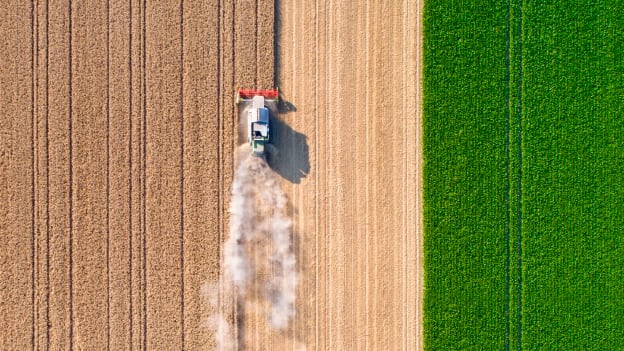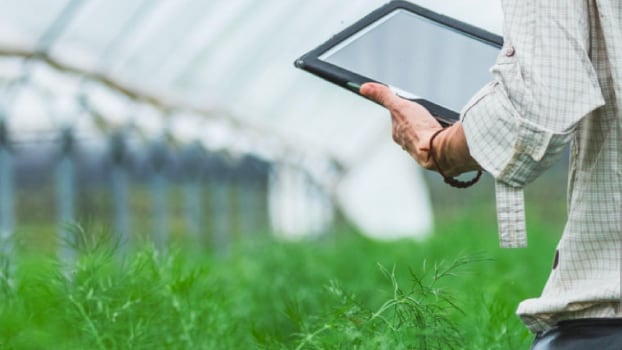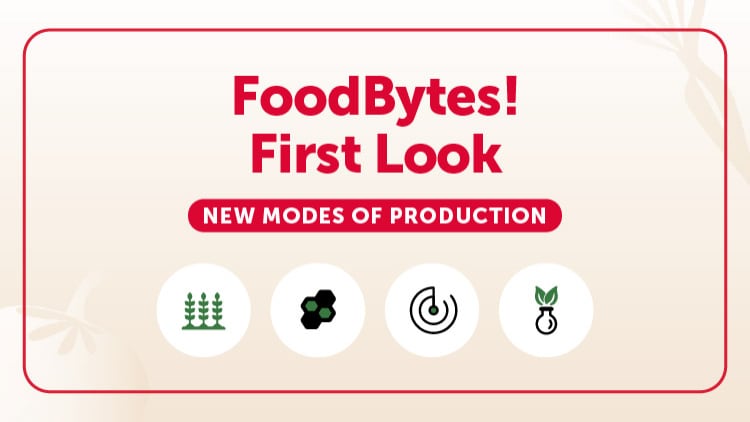The agrifood industry is pushing the critical importance of using resources sustainably to secure our food system. Collectively, the synergy and collaboration of all agrifood businesses – launching startups, ambitious scaleups and multinational legacy heavyweights – are vital to make our sustainability commitments a reality.
Globally, our population is moving closer to its projected figure of over nine billion by 2050 – a staggering two billion more than today.
“As business leaders, it is up to all of us to protect the future of the food supply, the planet and peoples’ livelihoods,” says Anne Greven, Global Head of Food & Agribusiness Startup Innovation and FoodBytes!, Rabobank.
Now more than ever, scaling startup brands and multinationals are collaborating to secure the future of our food. Innovation is critical in promoting a thriving food and agriculture (F&A) industry that can sufficiently feed our growing global population, now and in years to come. European innovation networks are at the heart of facilitating the collaboration and innovation needed to deliver a more sustainable food system. Growing these networks is key.
For many agrifood brands, the question then becomes: “Where can I find like-minded, environmentally-conscious innovators to collaborate with?” In Europe, support is available. Various initiatives, such Rabobank’s FoodBytes! innovation platform, exist to bring innovative agrifood businesses of all sizes together to create real change.
In this article, we are exploring the importance of cross-collaboration in creating a thriving innovation landscape. We will take a look at some of the successful collaborations that have flourished, despite the pandemic, as a result of connections and partnerships formed by participating in the FoodBytes programme.
Mutual Value-Adding Benefits Integral to Successful Collaborations
A collaborative approach to innovation creates opportunities for increased information-sharing, idea-generation and the ability to rapidly evolve to meet the health and sustainability needs of our planet’s entire food chain.

Mutually beneficial for both startups and corporations, collaboration enables better transparency, transformation, connectivity and change for our rapidly-expanding and evolving food system. Inherent within startups is their ability to maximise their agility, responsiveness and new technologies. Larger corporate players bring their extensive and specific industry knowledge, expertise, skills and resources.
To work towards agrifood progress, it is vital that both startups and larger players retain and share their talents, qualities and learned experiences. This will enable partners to forge a meeting of minds, a sharing of ideas and an application of innovation that creates genuine transformation.
No single new business model or technology is sufficient for our global food challenges. Securing the future of our food is not possible without collaboration across industry and brands.
Startup brands are often looking for collaborators who can save them time, support their successful scale up or fit into their vision in a win-win model.
By undertaking the challenge to find the right partners to unlock new potential in the marketplace, brands like Redefine Meat can remain “an agile startup on one hand, but [still] have access to markets, customers, processes or ingredients of an international conglomerate,” says Eshchar Ben Shitrit, CEO, Redefine Meat.
Large multinationals are in a position to offer and facilitate access to finance, knowledge and networks to enable startups to scale and explore previously untapped opportunities to grow and bring innovation to more people.
Founded in 1877 in Italy, Barilla Group is one of the world’s most recognisable pasta manufacturers. Even with its growth, longevity and success, the brand is still owned by the fourth-generation Barilla family. The brand taps into its entrepreneurial spirit and collaborative approach to pursue innovation through the implementation of new technology, production and processes.
Cross-Collaboration in Agrifood
In the agrifood industry, cross-collaboration can refer to both internal and external activities with partners. Internally, organisations may engage in a continuous loop of product improvement to remain nimble and meet changing consumer and industry needs.
Prioritising this collaborative relationship in-house enables businesses to remain responsive and efficiently integrate feedback into their models to hone their product offerings. By recognising and working to strengths, prioritising business needs and optimising decision-making, collaborative innovation can solve problems and create operational efficiency.
Food freshness innovator Mimica’s Founder and Director, Solveiga Pakštaitė believes that “the world’s greatest challenges will be solved only through collaboration.” Collaboration extends to all areas too, as Pakštaitė shares: “Within our team, we humbly invite feedback on our ideas and feel free to respectfully challenge and test the ideas of others. Externally, we enter into partnerships with like-minded businesses to help fulfil our mission.”
For Norwegian startup brand, Farmforce, cross-collaboration means everyone involved “utilises their strengths to solve the most pressing problems in the most optimal way,” shares CEO Anne Jorun Aas.
External cross-collaboration with large food companies enables innovative startups to access industry expertise, strategic advice, mentorship and tailored financial funding.
“The tasks ahead of us are tremendous – just like the potential impact and the opportunity,” says Redefine Meat’s Shitriton what cross-collaboration means to the animal-free meat technology innovators. “We decided from the early days to dream big and aim high, but to never make the mistake of thinking that we can do everything alone.”
Meeting Sustainability Goals
As F&A companies strive towards creating a more sustainable food system that supports the planet and its people, the industry’s collective efforts are under a glaring spotlight.
“We have 570 million smallholders globally. Most are poor, lack access to finance or farm inputs, and produce inefficiently under socially unacceptable standards and with unnecessary environmental costs – this must change,” says Farmforce’s Aas. “Cross-collaboration will play a crucial part in providing the new solutions that are required.”
Meeting our sustainability goals presents highly interconnected and complex environmental pressures. Together, businesses up and down the food supply chain will need to lower waste and emissions, while simultaneously increasing food availability and access, promoting balanced nutrition, and ensuring stable pricing and supply.
This mandate requires new levels of productivity and efficiency, which can be unlocked through innovation. Leveraging technologies and innovations such as genomics, precision agriculture and bio-based approaches will advance efforts towards a sustainable future.
With its purpose of “Good for you, Good for the Planet” (GYGP), collaboration plays a key role in Barilla’s sustainable agriculture code. As it strives to do business in a way that aligns with the United Nations’ (UN) 2030 Agenda for Sustainable Development, its code’s fifth principle is to “believe in listening and collaboration for continuous improvement.”
Barilla recognises that the sustainability of agricultural production is ongoing and ever-changing. Therefore, the brand enters into active discussions with its supply chain for opportunities to support sustainability goals. These conversations involve suppliers, trade partners, commercial agents, subcontractors and vendors. Barilla’s collaborative stance also extends to the broader sector, which includes universities, research institutes, non-governmental organisations (NGOs), businesses, farmers associations and governments.
Transparency and Traceability

Food chain players, big and small, are connecting with external partners to strengthen their ability to deliver transparency, traceability and transformation. Brands are also striving to increase their competitive advantage on distinct innovation topics by teaming up with partners that can provide specialist support.
French food transparency blockchain company, Connecting Food, has collaborated with major industry players such as Mondelez and Soufflet. “Without an agile company like ours, they would have never been able to develop and implement this technology in such a short period of time,” details Samantha Gadenne, Global Sales Director, Connecting Food.
Connective Food Chains
With complex and multi-tiered food chains, agrifood businesses receive global input. And today, consumers demand end-to-end traceability across the supply chain. To achieve traceability, industry agents need to work throughout the food system, from food producers and manufacturers to brands and retailers. Collaboration is critical to delivering full traceability.
Consumer demand for traceability information can vary significantly depending on the product and production process. Thus, a tailored approach to what a farmer, retailer or manufacturer is looking to showcase is important. The data Connecting Food aggregates, for example, is used to reconnect consumers to the product manufacturer, prove a product’s origin or certification, and enable agents to demonstrate commitments such as fair pay, sustainable sourcing, and regenerative agricultural practices.
“The agrifood industry is entering a digital revolution, meaning that today, we are only at the tip of the iceberg of what we will one day be able to share,” emphasises Connecting Food’s Gadenne.
Barilla encourages “open, transparent and caring partnerships with its communities.” The large-scale manufacturer prioritises good farming and agricultural practices that minimise raw material waste; agricultural and rural development; agricultural input management; soil respect and soil quality improvement; water conservation programmes; biodiversity; and animal welfare.
Continuous improvement is imperative to foster reliable and strategic supply chains. Barilla commits to improvement and prioritises a list of actions documented per country; the results of which are reported in its annual GYGP report. It also actively pledges to follow guiding principles that include involving key external partners; having open debates with NGOs, enabling access to data and results; and supporting farmers in adapting rules to their local areas.
Supporting various programmes in Europe, Barilla leveraged the FoodBytes! platform to run several innovation sprints in a short time frame. The household brand demonstrated the importance of global cross-collaboration to identify leading solutions and harness innovation.
Top Tips to Create Successful Collaborations
Pairing with the right agrifood partner is critical for a successful collaborative partnership that drives real innovation.
“Start small, in order to scale big,” highlights Connecting Food’s Gadenne.
When choosing a potential collaborator, there are several key factors to consider. Align your values and think about your goals first, know your value proposition and trust your gut instinct when entering a new cross-industry partnership.
“The right corporate partners can help startups scale their missions quickly – standing on the shoulders of giants allows us to achieve maximum impact together, but this only works if both parties are on the same page to start with and goals are aligned,” stresses Mimica’s Pakštaitė.
While cross-collaborations can take many forms and shapes, Farmforce’s Aas conveys the “critical part is a willingness from both parties to listen, be willing to discard preconceptions and come up with something better.”
Implementing new technology and innovations can be daunting for multinational food companies due to the level of internal cross-collaboration required to ensure their successful deployment. This has been Connecting Food’s experience, Gadenne shares: “Big corporations can feel easily overwhelmed when thinking about implementing blockchain technology simply because of their sheer number of product lines or stock-keeping units (SKUs).”
To overcome any sense of overwhelm, Connecting Food recommends starting with a reduced scope, such as a specific food chain. Once the systems are connected, expand the scope and build a stronger collaboration that is more scalable for both parties.
Moving Forwards, Collaboratively
Together, startups and multinationals can use their partnerships, investments, research and development (R&D), education and engagement opportunities to better connect and build trust with consumers.
As we move through 2021, it will be interesting to see how F&A businesses, big and small, adapt, develop, and plan for five to ten years. And how they will collaborate with other innovative companies to understand and tackle sustainability, transparency and connectivity.
To secure the future of food, it is crucial to increase awareness of these collaborative initiatives that enable startups and multinationals to team up, harness opportunities, and build their knowledge. By working together, F&A businesses can achieve their own business goals and find innovative solutions for the planet.





